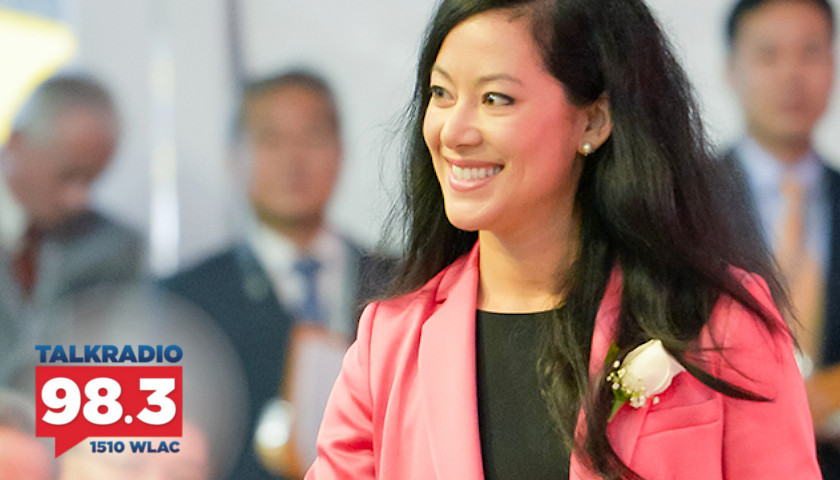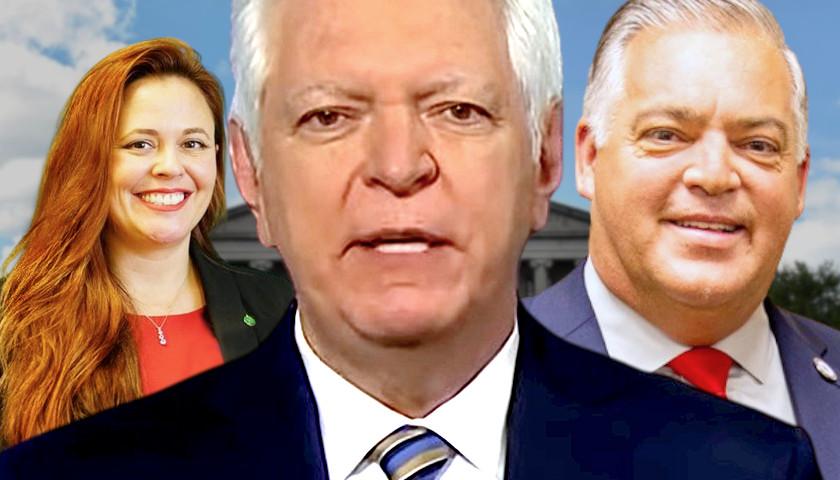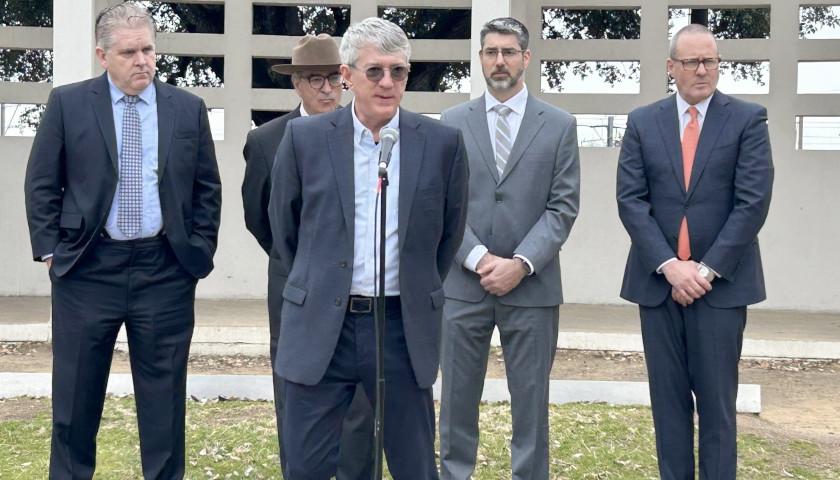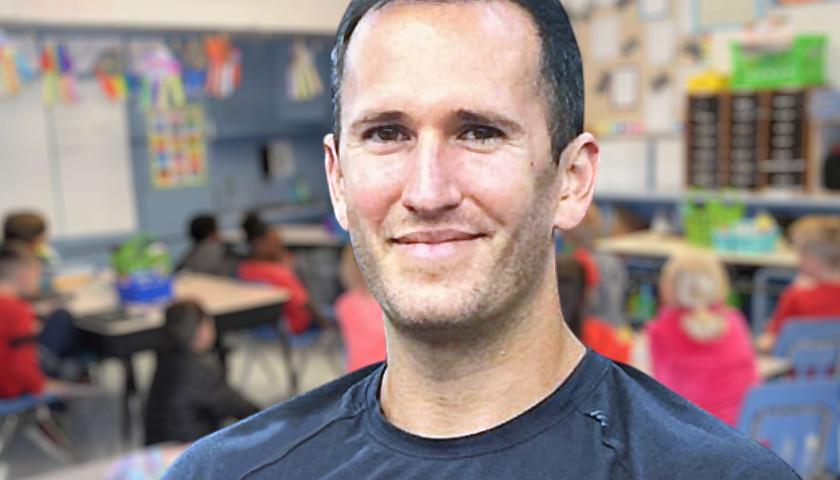Live from Music Row Friday morning on The Tennessee Star Report with Michael Patrick Leahy – broadcast on Nashville’s Talk Radio 98.3 and 1510 WLAC weekdays from 5:00 a.m. to 8:00 a.m. – host Leahy welcomed May Davis, former legal advisor to President Donald Trump and visiting fellow with the independent women’s form to the newsmakers line to discuss her background working with the Trump administration, Big Tech platforms, and the First Amendment.
Leahy: We are delighted to our newsmaker line, May Davis. She’s a former legal adviser to President Donald Trump. And she’s a visiting fellow with the Independent Women’s Law Center. Good morning, May.
Davis: Good morning. Thanks for having me.
Leahy: Well, we’re delighted to have you here. You have a great background. You are a graduate of the University of Kansas School of Journalism. That’s the Lawrence campus right?
Davis: That is.
Leahy: It’s a beautiful campus by the way.
Davis: Thank you. And you know, it’s a great basketball school, but it’s a good school, too.
Leahy: Are you a Jayhawk?
Scooter: Rock Chalk Jayhawk!
Leahy: Rock Chalk Jayhawk. Does that resonate with you May?
Davis: Yes, it does. And so sometimes when you say rock chalk to someone, they have to say rock chalk back. But sometimes if you say rock chalk, they have to say Jayhawk back. And you just kind of have to look at them and decide which they’re looking for.
Leahy: (Laughs) That’s very good. So are you a native of Kansas?
Davis: I am a native, actually, New Orleans, Louisiana. But I grew up mostly in Kansas. So I claim Kansas now.
Leahy: My brother was a teacher in Kansas for many, many, many years. Where in Kansas did you grow up?
Davis: So I lived in two cities. One is Goodland, Kansas. No one will have heard of it unless you are in desperate need of a rest stop on I70. So that’s on the border of Colorado. And then Kansas, which is kind of close to K State.
Leahy: So what did your folks do there?
Davis: So my dad is a doctor and my mom is also a teacher. And I was a teacher for a few years in Kansas City as well.
Leahy: You were a teacher. Did you teach in a public school or a private school?
Davis: So it’s a charter school in Kansas City and it’s very interesting. They’ve got a couple of charter schools, but their public school system is actually not accredited, meaning a college doesn’t actually have to recognize your Kansas City public school diploma.
I mean, they do, but they don’t have to. So I taught a charter school that actually underperformed, underperformed. t the Kansas City public school system. So it was an interesting two years.
Leahy: It sounds like it was quite a challenge for you. (Davis chuckles) You know, who was at a time, I think he was for a while and he’ll be on our program later today. You probably know him. He has something in common with you, I think. And that is Kris Kobach, who was a professor of law at the University of Missouri, Kansas, for a period of time.
Davis: Yes. A very familiar Kansan.
Leahy: And he’s got a high profile on some of his litigation. Now you went from teaching at a charter school in Kansas City to Harvard Law School. What was that transition like?
Davis: I think it’s intimidating for a lot of people in the Midwest to just go to Harvard and say like can I read and write the same way that all these other people? It is a scary thing. And it turns out you can.
It was a really wonderful experience. And less so as time goes on when you first get there was what I would consider true diversity. Everyone had a different background, a different life story. And you got to sort of learn like that.
And then by the time my third year had rolled around and there were a lot of riots because of the Ferguson, Missouri, the shooting happened then it became less so. I feel sorry, I think, for the Harvard law students now, especially after the pandemic where they really can’t experience their classmates in the way that I originally could. But I truly loved it.
Leahy: She may not have been on faculty at that time. Did you ever have Elizabeth Warren as an instructor?
Davis: So funny enough, we had her husband and she had just left. But she would have been my contract Professor in my section if I was there one year earlier.
Leahy: Missed her by this much! (Laughter) Tell us how you came to become a legal adviser to President Donald Trump.
Davis: After law school, I did what law students do. And I clerked for a federal judge, moved to Denver, Colorado. And I was just content to be in Denver. In case Hillary won, I wasn’t wanting to live in Hillary Clinton’s, D.C.
I did not think that that would be a very fun experience. And I stayed in Denver. But Trump won. The miracle happened. And I got a phone call from some friends who, for one reason or another, we’re not able to work in the administration.
And they thought that I’d be good. And so they gave me a call and I worked all four years. I was there from day one to the last day. It was an incredible experience.
Leahy: Where did you work in the White House? For the chief of staff and some other parts of the White House?
Davis: So I worked in several offices. One is an office that very few people have heard of. It’s called the Staff Secretary’s office. Fascinating office. And you travel around with the president and basically help organize both the president and the White House.
So you create memos, briefings, and help run meetings. It’s a lawyer job. So the Supreme Court Justice Bret Kavanaugh had that job for President Bush. Then after that, I worked for the deputy chief of staff. But basically the chief of staff, John Kelly, for a few years.
And then at the end, I worked in the White House counsel’s office, Pat Sipalone. And actually, while everyone was doing impeachment, I helped more with the policy side. Is this legal? Can we do this?
How can we do this? I want to get that done. It’s a fascinating place to be a lawyer because your problem-solving. Like, can we do something? And you can’t just Google it. There’s no answer. You have to, you know, figure it out uniquely.
Leahy: How exhausting were those four years?
Davis: Well, my skin is definitely better now than it was then. It was very exhausting, especially at first. The first 100 days, only teaching can compare to the amount of work that that is. And then as it gets further on, it becomes manageable.
I don’t know whether that’s because you’re just so used to the lifestyle or whether at some point you’ve tried those things. And so if somebody asks you a question, can I do this? Oh, you asked me that two years ago. I know the answer to that. (Leahy laughs)
Leahy: Did you come across a friend of mine? And now once and once again, colleague at Breitbart, where I also write, an attorney and good friend by the name of Ken Klukowski?
Davis: That name is definitely familiar, but we did not work closely with each other, unfortunately. There’s a couple of other Breitbart people that I don’t think went back, but I didn’t work with Ken that closely.
Leahy: Tell us about the style of working closely with President Donald Trump.
Davis: I think the one big thing that was surprising to people when I tell them this is how much he listened to women. This is somebody that when he took office, oh you know, he doesn’t respect women. That was one of at the time.
Now everything he’s Russian agents like people lost their mind. But at the time, everyone’s big complaint was sort of a women’s thing. But whenever I was in the room, he would scan the room for whose eyes seemed like they wanted to say something, and he would call on them.
And so there’s a lot of research that men speak up when they’re 20 percent confident in their answer. And women speak up when they’re 80 percent confident here.
Leahy: If you’re a talk radio host, you speak up when they are five percent confident. But keep going. (Laughter)
Davis: There probably are a lot of times in meetings where a woman is unlikely to just offer random advice to the President of the United States. But the president can look around and he can tell, he can sense that there’s something that’s left unsaid, and he will ask it.
And there’s just something about being a woman who has a voice that hasn’t been expressed yet in that room. He will quiet the room and he will listen to you. And so that’s why some of the closest advisors, Kellanne Conway and Hope Hicks were women.
And so I thought that that and every time I was in the room with him, if I wanted to say something and if I had to say something, I felt like I was able to say it. And that was incredible.
And it’s tough because he does take advice from so many people from so many sources. It was my job to kind of trying to organize him and manage him, like how the information was received. It’s an impossible job. You can’t do it. (Leahy chuckles)
There were so many things that we tried to do to make that better. And so it is both a blessing and it made my job very difficult. But I think in general, you do want the president to be able to and for people to be able to speak up.
So that was something that I found very, very helpful. But also, if you have a president like George Bush, you just had to be very regimented. And he only received this information from approved sources. It makes that organization piece a bazillion times easier. It prevents good ideas from reaching.
(Commercial break)
Leahy: May, You have a terrific article at Townhall. Headline, Crack Down on Social Media Censorship Exposes Conservative Fault Lines. And your conclusion is we’ve now seen a state generally in favor of light regulation on personal freedoms. Choose heavy regulation for the Internet.
That may well be a policy our friends in Florida, the Sunshine State, live to regret, or live to love. But the question is whether it’s a policy they can lawfully choose. Can you elaborate on that for us May?
Davis: Yes. Social media regulation is, I think, a topic you almost can’t learn about, because what are you going to do? Google it?
Leahy: Hold it. That is a great line. That is a great line. Scooter, we’re going to have to record that and keep it. That’s one of the best lines I’ve heard in some time, May.
Davis: (Chuckles) Thank you. Starting from the White House when we were thinking about these issues and even now, if you Google Florida’s social media law, it’s just negative, negative, negative, negative.
But when you think about it, when you Google abortion, what are you going to see? When you Google anything, you see what Google wants you to see. And that’s the same way it is on Twitter. And it’s the same way it is on Facebook.
You see what these companies want you to see. Now Florida says no, you should be able to opt-out of that. So the Florida law does a lot of things. I think they’ve gotten a lot of press on you can’t de-platform political candidates.
And people are, I guess, referencing Donald Trump. It’s not just about that. They say that they have to publish their standards on how they censor you and how they do platform you. And then they have to apply those standards fairly.
So they can’t just say because you’ve said the word, transgender. Now I’m going to watch you a little bit closer. There has to be something that they apply fairly. Alright. Well, then people who are transgender and say that then you get banned and blocked too.
It’s burdensome. It’s a lot. But it’s interesting. And so it’s not one of those issues where everyone said, oh, well, DeSantis is doing this just for political gains. It’s not a clear political winner.
There are a lot of conservatives who do not like the government telling people how to run their business. And at the end of the day, these are social media companies running their business.
And this is Florida telling them how to do that. And people like the Internet. It’s one of the few things in this country that works. It’s not an airline. It’s pretty great. And every day there’s a new cool thing on the Internet.
So you’ve got that side of conservatives who really are kind of free marketing. And they like the freedom of the Internet, even if it means you can’t see the Hunter Biden laptop story. That’s a negative. But there are so many positives.
Then you’ve got another group of people that are like this is the hill worth dying on because the social media companies run the way that we think. They control access to information. And unless they’re regulated or at least threatened with regulation, they’ll take over the culture.
There will be things you can’t say. It will be the 1984 lifestyle. People bring up three big legal problems with Florida law. And that’s what my article really gets into. And actually, yesterday a judge ruled preliminarily on these.
Leahy: What was your ruling? Was it in federal district court?
Davis: It was in federal district court. And it was a Clinton-appointed judge in Florida who ruled that Florida’s law is both unconstitutional and many provisions conflict with federal law. Florida has already said that they’re going to appeal that.
They’ll get three judges on the appellate court to look at it. But the legal challenges are basically this. One, there’s a First Amendment right that Facebook and Google saying that they have is you can’t tell me what to say.
And they resulted to that. And of course, the judge didn’t buy it. So we’re not telling you what to say. And no one would ever think that Twitter, that Jack believes what Donald Trump says on his own Twitter.
So no one by hosting a candidate you’re not saying now Twitter, you speak. They are two different things. Twitter is a platform. And California has a law that says shopping malls have to allow some amount of speech on their private property.
And the shopping malls in the 80s said, no, no, no. I don’t want to do that. I have the right to speak for myself. And the Supreme Court said, no, you’re not speaking. You’re just hosting people. And it’s the same here.
Twitter, when Donald Trump speaks, and whoever that they disagree with speaks, it’s not Twitter speaking. They’re hosting people. So I think the First Amendment is a little more wiggly than at least the judge in Florida would say. But it’s a tough challenge.
Leahy: May Davis, thanks so much. We are out of time. Can you come back again? And by the way, nothing is intellectually more interesting than the concept of a wiggly First Amendment. I like that phrase, too.
Davis: (Laughs) Well, thanks for having me. And yes, I’d be happy to talk about the Internet anytime, because you can’t find this information. We will have you back on May, and we’re delighted to have you on. Thanks so much.
Davis: Thanks.
Listen to the first hour here:
– – –
Tune in weekdays from 5:00 – 8:00 a.m. to the Tennessee Star Report with Michael Patrick Leahy on Talk Radio 98.3 FM WLAC 1510. Listen online at iHeart Radio.
Photo “May Davis” by Independent Women’s Forum.




